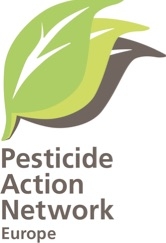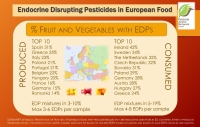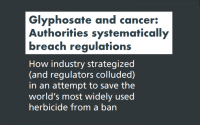Press releases
Last week, the French tribunal of Foix sent 4 prejudicial questions to the European Court of Justice, regarding the lack of reliability of the current EU pesticide risk assessment. This is a very timely event as the glyphosate debates raise identical issues. The answers from the European Court of Justice might lead to a major improvement of the safety of citizens and the environment in the EU.
A new research study[1] from the European Commission’s Joint Research Centre and two Dutch laboratories shows that 45% of Europe’s top soil contains glyphosate residues, demonstrating the over-reliance of the EU agricultural model on this harmful herbicide chemical. In contrast to what its manufactures[2] purport, glyphosate persists in soils affecting not only soil fertility and crop quality, but also human and environmental health.
Today 389 of the 694 members of the European Parliament voted against Commission's controversial proposal for criteria for endocrine disrupting pesticides. The Parliament, for the first time ever, used its tiny democratic right of "scrutiny" it has in this case, the right to block a Commission proposal. Commission now has to go back to the drawing board and change the proposal together with the representatives of the Member States in the Standing Committee.
One-third of European fruit contains 27 potentially harmful endocrine disrupting pesticides (EDPs), reported in scientific literature to cause endocrine disruption in animals and probably in humans.
A new analysis of the Pesticide Action Network reveals that European Commission's health service DG SANTE approves the use of pesticides with potential carcinogenic metabolites as a standard procedure (Table 1 in attached analysis, e.g. Carfentrazone, Mesotrione, Flazasulfuron, Metsulfuron).
The EU ministers for agriculture and fisheries will have their informal meeting in Tallinn, 3-5 September, to discuss “Risk management: empowering our farmers with effective tools to manage the risks post-2020”.
A new report by toxicologist Dr Peter Clausing explains how EU authorities, in plain violation of their own rules, disregarded scientific evidence to reach the “predetermined” conclusion that glyphosate does not cause cancer.
Today, on the occasion of the conference "The CAP: have your say!" presenting the results of the consultation on the future of the common agricultural policy (CAP), PAN Europe reiterates its call upon the European Commission to encourage one serious long term objective of the CAP: development and maintenance of low impact farming systems in all parts of the EU.
Tomorrow, the Committee on Environment of the European Parliament will gather to discuss and vote on 3 motions for resolution tailor-made for the pesticide industry to keep bee-killing pesticides in the market
So far more than one million Europeans have signed the European Citizens’ Initiative (ECI) to ban glyphosate, reform the EU pesticide approval process, and set mandatory targets to reduce pesticide use in the EU. The ECI organisers call on the Commission to respect the signatories’ demands by refusing a new licence for glyphosate.



